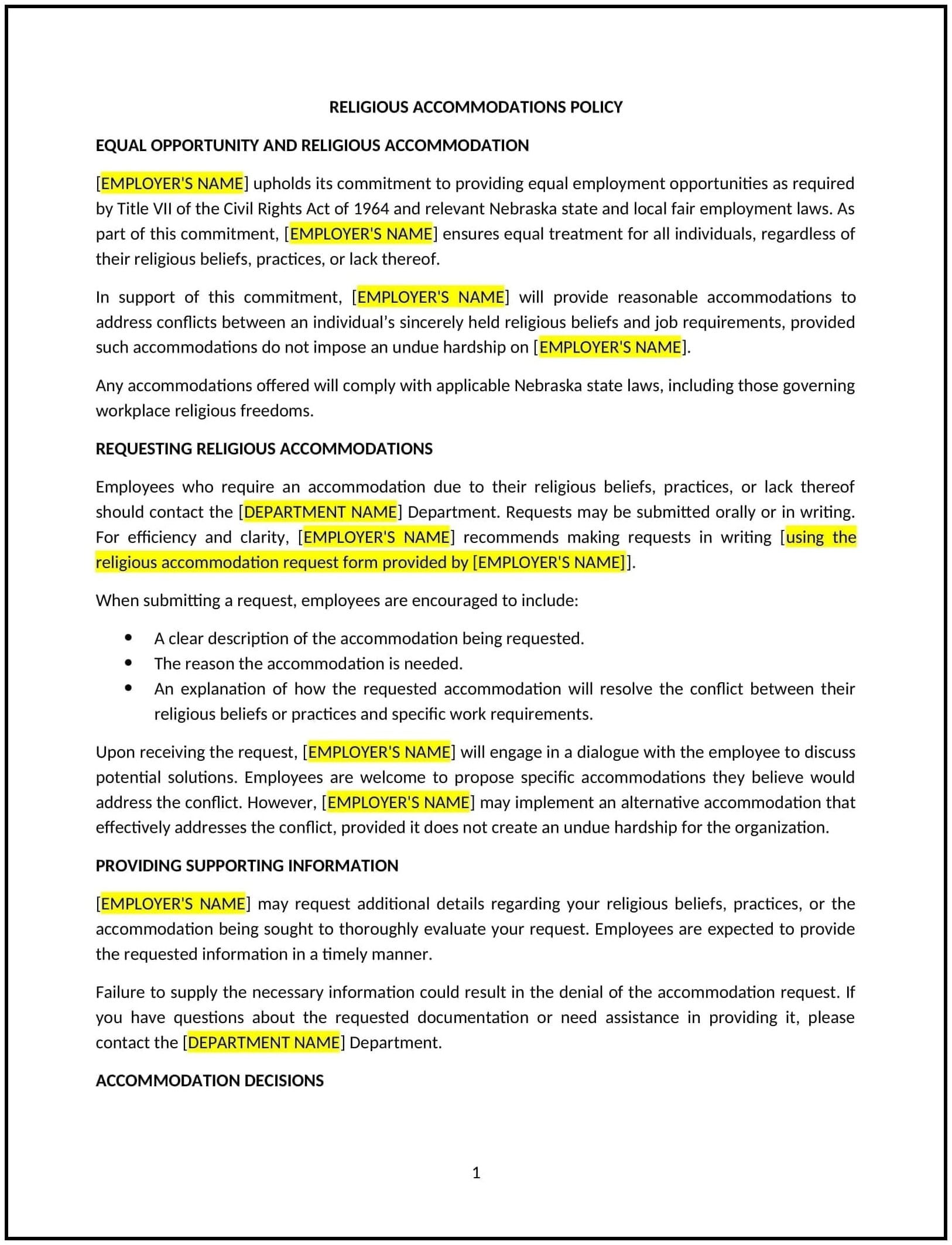Religious accommodations policy (Nebraska): Free template
Got contracts to review? While you're here for policies, let Cobrief make contract review effortless—start your free review now.

Customize this template for free
Religious accommodations policy (Nebraska)
A religious accommodations policy helps Nebraska businesses establish guidelines for accommodating employees’ religious beliefs and practices in the workplace. This policy is designed to promote inclusivity, respect, and fairness while balancing business needs. By formalizing procedures for handling religious accommodation requests, businesses can create a supportive environment that values diversity and fosters mutual respect.
By implementing this policy, businesses in Nebraska can enhance workplace culture, improve employee satisfaction, and demonstrate a commitment to inclusivity and respect for religious diversity.
How to use this religious accommodations policy (Nebraska)
- Define religious accommodations: Clearly explain what constitutes a religious accommodation, such as flexible scheduling, dress code modifications, or time off for religious observances.
- Establish request procedures: Outline the process for employees to request religious accommodations, including whom to contact and what information to provide.
- Set evaluation criteria: Describe how businesses will evaluate accommodation requests, considering factors such as business impact and feasibility.
- Address undue hardship: Explain the concept of undue hardship and how it may limit the ability to provide certain accommodations.
- Communicate the policy: Share the policy with employees during onboarding and through internal communications to ensure awareness and understanding.
- Train managers: Educate supervisors on how to handle religious accommodation requests fairly and respectfully.
- Document requests: Maintain records of all accommodation requests, evaluations, and outcomes to ensure consistency and accountability.
- Review and update the policy: Periodically assess the policy’s effectiveness and make adjustments as needed to reflect changes in workplace dynamics or legal requirements.
Benefits of using this religious accommodations policy (Nebraska)
This policy offers several advantages for Nebraska businesses:
- Promotes inclusivity: Clear guidelines help create a workplace that respects and values religious diversity.
- Enhances employee satisfaction: Accommodating religious practices demonstrates respect for employees’ beliefs, boosting morale and loyalty.
- Reduces conflicts: A formal policy minimizes misunderstandings and disputes related to religious accommodations.
- Aligns with Nebraska values: The policy reflects the state’s emphasis on community, fairness, and mutual respect.
- Improves workplace culture: A supportive environment fosters trust, collaboration, and a sense of belonging among employees.
- Supports legal standards: A formal policy helps businesses align with federal and state laws regarding religious accommodations.
- Builds trust: Transparent procedures demonstrate the business’s commitment to fairness and inclusivity.
Tips for using this religious accommodations policy (Nebraska)
- Communicate the policy effectively: Share the policy with employees during onboarding and through regular reminders, such as emails or training sessions.
- Provide training: Educate managers on how to handle religious accommodation requests fairly and respectfully.
- Be proactive: Encourage employees to request accommodations early to allow time for evaluation and implementation.
- Document thoroughly: Maintain detailed records of all accommodation requests, evaluations, and outcomes to ensure consistency.
- Address concerns promptly: Create a process for employees to raise questions or concerns about accommodations and resolve them fairly.
- Review the policy periodically: Update the policy as needed to reflect changes in workplace dynamics, employee needs, or legal requirements.
- Lead by example: Ensure senior leadership demonstrates a commitment to inclusivity and respect for religious diversity.